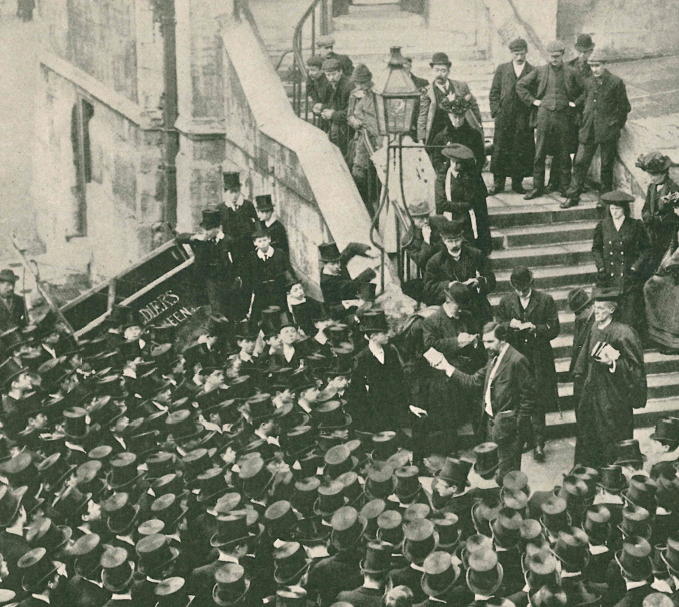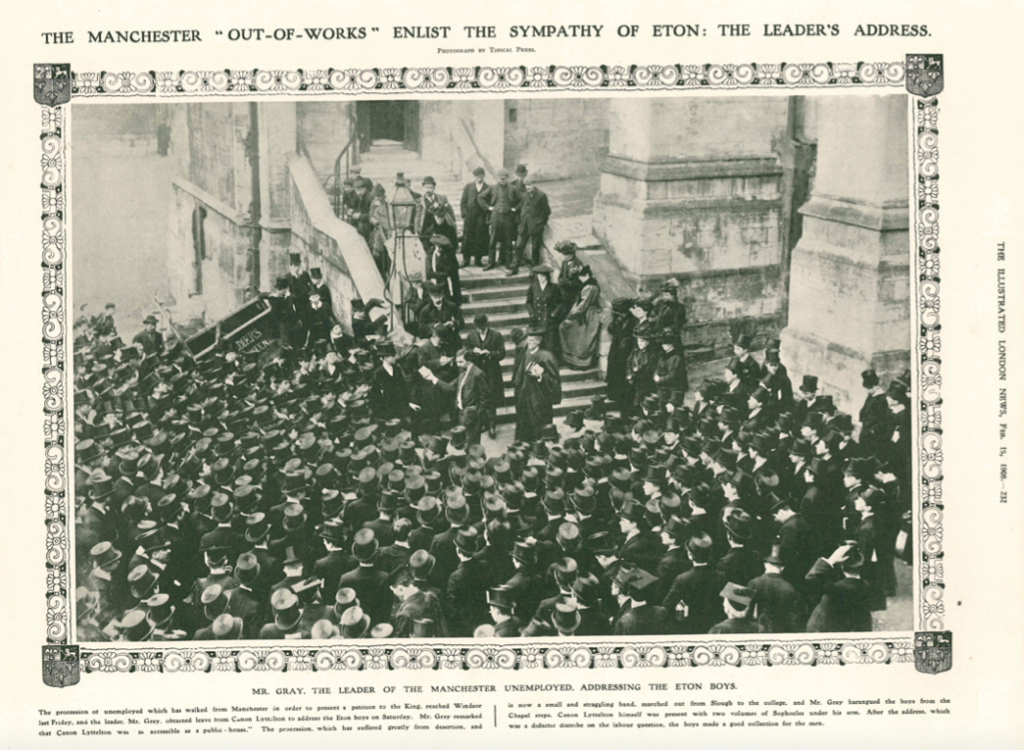(This article was originally published in the OEA Review 2020.)
A speech from an anti-poverty campaigner at Eton and the sum of £7 10s caused a flurry of combative correspondence in the Eton College Chronicle, and the national press, in 1908. It also generated this dramatic image I rediscovered during a lockdown clear out, bought it on eBay some years ago.

It shows the leader of the ‘Manchester Unemployed’ Alexander Stewart Gray speaking on the chapel steps, with the headmaster Edward Lyttleton, surrounded by boys. Some of Gray’s comrades can be seen further up the steps and several reporters are also pictured. And their presence is the start of a war of words on the pages of the Chronicle that began with a letter prompted by a report of the speech in the national press.
The Manchester Unemployed marched south according to one report and, on their way to petition the King, paused at Slough in early February. Gray went to Eton in the hope of addressing the boys. He said of his approach to the school for permission that the headmaster was “as accessible as a public house.”
Under the headline THE UNEMPLOYED, the Chronicle (13/2/1908) briefly reported that “a deputation of the Unemployed of Manchester” held a meeting in school yard just after noon “where large numbers of the school were present, who cheered wildly at intervals, and appeared greatly diverted by the presence of a photographer.”
The report continues: “the chief speaker was a Mr Gray who claimed for every englishman the right to have a share of his country’s soil and to express his own life.”
The Illustrated London News (15/2/1908) offered a more colourful description of the occasion disparaging the speaker and the protest. Mr Gray “harangued the boys” with a “didactic diatribe on the labour question” and remarked that “the procession… has suffered greatly from desertion and is now a small and straggling band.”
In the same edition of the Chronicle as the original report, a letter prompted by press reports also appears. The disapproving correspondent signed off as A. V. P. (presumably an OE) and expressed his disapproval at the “unthinking generosity of the School” for raising a collection of £7 10s for the marchers. “May I point out that,” he writes, “such giving is vicious and mischievous: and that those with surplus funds would be far better advised if they contributed their money to funds properly managed and properly organised, such as the Eton Mission.”
This letter, however, is mild in comparison to one published in the next Chronicle (20/2/1908) titled DESECRATION OF THE CHAPEL STEPS. The letter is anonymous and signed from ‘One of Many Old Etonians’ and is outraged that Gray was given a platform at all, let alone the right to speak from the steps of College Chapel: “We should be glad to know why every stone in ‘schoolyard’ was not pulled up in defence of our most cherished and valued traditions.” The letter continues by asking why the Etonians did not raise a voice of objection to the “the so-called ‘representatives’ of the equally ‘so-called’ unemployed.”
The final paragraph of the letter reads: “are we really to believe that, in all that large gathering of members of some of our best families, not one voice was raised in protest against the bullying extravagancies (sic) of – we cannot say workmen for work they would not, if they could – uneducated beings of meaner intellect. God help England in future ages and future emergencies, if it really was so.”
The Editors of the Chronicle replied underneath that “we feel bound to print this letter as a bona fide expression of opinion, but we cannot refrain from deploring that we should have received it… we feel bound to express to assert to our readers that if an attitude like that of our correspondent is encouraged in the minds of present Etonians, the consequences to the country will be absolutely disastrous.”
(In the Chronicle dated 5/3/1908 ‘Another Old Etonian’ congratulated the editors on this comment by saying ‘it is such fossilised snobbery – such class ‘hatred, malice, and all uncharitableness – that stands in the way of the real advance of our country.”)
In four subsequent weekly editions of the Chronicle, more letters were published. In the 27/2/1908 edition ‘One of Many Present Etonians’ rejected the notion that the boys were persuaded by the speech and sympathetic to the cause in reply to the anonymous OE: “If it worries him to think that ‘Etonians etc. permitted the man to command their attention,’ I can assure him that very few of them did so.” The Etonian also notes that the letter is “one of the most disgraceful effusions of unqualified snobbery which it has ever been my fate to read” whilst pointing out that Gray was not only university educated but also called to the Bar.
In the same edition of the Chronicle, E. G. Selwyn, later Dean of Winchester, wrote that many Old Etonians have been “deeply offended by the spirit which has been displayed in the letters of complaint.”
The unemployed march from Manchester in 1908 is now an obscure historical footnote but ‘hunger marches’ are a familiar aspect of protest and campaigning in the first half of the 20th century, with the most famous being the Jarrow march in 1936. Sadly, amidst all the voices in the valuable resource that is the fully digitised Chronicle archive online, the one man who doesn’t have his views recorded any great detail is Mr Gray himself.
